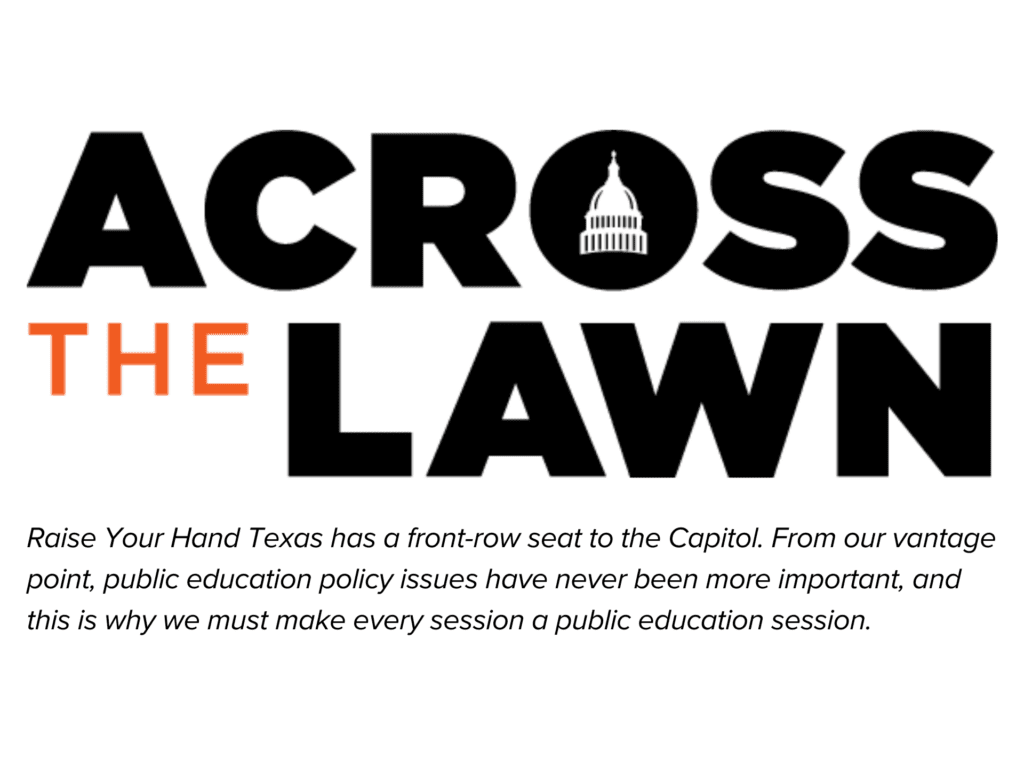
categories
Across the Lawn – August 15, 2025

August 15, 2025

IT’S TIME TO REIN IN STAAR AND FIND A BETTER WAY FORWARD
This year, our schools face both exciting changes and real challenges, from classroom innovations to important policy shifts. As the Texas legislature looks to “eliminate the STAAR Test,” Raise Your Hand Texas encourages everyone to reflect on local assessment & accountability indicators and the extracurricular activities that make our schools and our students so much more than one test on one day.
1. First Called Special Session Ends, Second Called Special Session Begins
The first special session ended today, Friday, August 15, without action on redistricting, flood relief, property tax cuts, or assessment reform after House Democrats left the state to block a quorum. Within hours, Governor Abbott called a second special session to start the same day with the same agenda. The call includes legislation to eliminate the STAAR test and replace it with effective tools to assess student progress and ensure school district accountability. Lawmakers are expected to resume work immediately.
2. From STAAR to Something New? The New Proposals for the Future of Texas Assessments Don’t Seem to Change Much
During the First Called Special Session of the 89th Legislature, the identical Senate Bill 8 (SB 8) and House Bill 8 (HB 8) were being described as significant steps in Texas assessment reform, but both leave major elements of the current state testing system unchanged (the Senate passed Senate Bill 8 with a vote of 22-6 on Tuesday, August 12). Under both proposals, STAAR continues in all grades and subjects until at least the 2027–28 school year, and the A-F accountability system still remains almost entirely dependent on the criterion-referenced, one-day one-test model.
While SB 8 and HB 8 allow districts to use either the Texas Education Agency’s (TEA) Beginning and Middle of Year formative assessments or select from an approved vendor list, the End of Year test remains criterion-referenced and not nationally normed. This limits comparability to other states and delays the use of a full growth-based model until 2032–33 under the provisions in the bill language.
Most districts already use formative assessments, such as MAP Growth or Renaissance, during the school year to track student progress and guide instruction. These local assessments give teachers timely feedback and often align more closely to classroom learning than the state’s end-of-year measure. While SB 8 and HB 8 acknowledge the value of measuring growth over time, the legislation requires two additional state tests, and it is not clear how TEA intends to integrate these assessments into the state accountability system.
The bills also do not add any new indicators to the state’s A–F accountability system. The new proposal directs TEA to collect data on student engagement and workforce development measures, but this information is for reporting purposes only and is not included in campus or district ratings. Participation in providing these measures is optional for school districts, meaning the accountability framework will continue to rely on its current set of indicators.
Assessment and accountability remains central to how local communities understand school performance, how districts plan and allocate resources, and how the Legislature evaluates the impact of state education policies. These systems shape public confidence in schools, influence budget and staffing decisions, and drive program improvements.
Raise Your Hand Texas supports strong assessments that help inform instruction and a robust accountability system. We also see the opportunity to improve both of these bills, and we appreciate the Legislature’s effort to continue discussing this important policy matter.
3. New School Year Brings Wide-Ranging Changes from 89th Legislature
As students and educators return to school this fall, a slate of new laws from the 89th Regular Session will shape classrooms and campuses across Texas. House Bill 2 provides $8.5 billion in additional funding for public schools over the next two years, including teacher and support staff raises, special education, early literacy, and career and technical education programs. House Bill 6 expands in-school suspension options, adjusts Discipline Alternative Education Programs (DAEP) requirements for vaping incidents, and authorizes virtual DAEP alternatives. House Bill 1481 restricts the use of cell phones and smartwatches during school hours, though each local school board will decide how to enforce the law. Senate Bill 10 requires every public school classroom to display a framed copy of the Ten Commandments, and Senate Bill 207 allows students to be excused for mental health appointments. Senate Bill 1191 standardizes how high school GPAs are calculated and assigns additional weight for advanced courses such as honors, Advanced Placement, International Baccalaureate, dual credit, and OnRamps.Other changes include a new requirement for public school districts to set aside time for prayer or religious reading if they adopt related policies, and a prohibition on school-sponsored LGBTQ clubs and diversity, equity, and inclusion programs under Senate Bill 12. Senate Bill 13 gives school boards and parents final say on materials in some school libraries, while new nutrition rules ban certain additives in free and reduced-price school meals. High school students will be required to take at least one semester of personal financial literacy beginning in the 2026–27 school year, and a new school choice program will provide Education Savings Accounts (ESAs) for private school costs starting the same year. Together, these measures reflect a broad and complex mix of policy priorities that will influence how students learn, how teachers teach, and how communities experience public education in Texas for years to come.
4. School Accountability Ratings Released Today
TEA released the 2024 and 2025 A-F accountability ratings for school districts and campuses. The ratings will be available at txschools.gov. We will provide further analysis of the ratings in the coming weeks.



